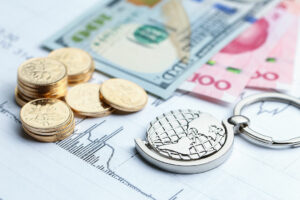THE WORLD BANK has approved a $750-million loan for the Philippines meant to help boost investments in sustainable projects.
“The World Bank’s Board of Executive Directors has approved new financing support for the country’s policy reforms aimed at boosting environmental protection and climate resilience, as the country strives to accelerate economic recovery and boost long-term economic growth,” it said in a media release dated June 13.
The country’s first sustainable recovery development policy loan aims to increase private investment in renewable energy, improve plastic waste management, promote green transport, and mitigate climate-related risks in agriculture.
World Bank Country Director for the Philippines Ndiamé Diop said the Philippines has “tremendous potential” in renewable energy.
“Government actions to encourage investments in this sector, such as promoting foreign direct investments and streamlining the permitting process, could unlock this potential,” Mr. Diop said in a statement.
“Renewable energy can help the Philippines mitigate climate change and bring numerous benefits, including enhanced energy security, the creation of green jobs, and improved access to electricity. It is a crucial step towards a more sustainable and resilient future for the country,” he added.
The Philippines is targeting to increase the share of renewable energy to 50% of its total power generation mix by 2040.
“This increased focus on renewable energy is pursued in parallel to slowing the expansion of coal-fired power generation capacity from 2026 onwards. Achieving these targets will require a significant increase in investments in solar and wind technologies and a strong policy environment conducive for investment in renewable energy,” the World Bank said.
The policy loan will also support insurance products for smallholder farms and strengthen the Philippine Crop Insurance Commission’s operations.
“The aim is to help mitigate climate-related disaster risks to the country’s budget and the farming sector. If properly designed and targeted, crop insurance can help stabilize farm income, reduce poverty, and provide a climate safety net for food producers,” it added.
The Philippines, China, Indonesia, Thailand, and Vietnam account for 55-60% of the plastic waste that enter the ocean, according to the World Bank.
In the Philippines, there is an estimated 1.7 million tons of post-consumer plastic waste generated annually.
“To help address this challenge, this financing supports the implementation of the Extended Producer Responsibility (EPR) Act mandating large enterprises to recover up to 80% of plastic packaging waste by 2028,” the multilateral lender said.
“Under the EPR Law, the financial burden of waste management is shifted to business enterprises, which will reduce the need for public money to pay for the collection, segregation, disposal, and cleanup of packaging product waste created by these enterprises,” it added.
The program will also support other reforms, including the amendments to the Public Service Act, which allows full foreign ownership in more public services such as telecommunications, airlines, and railways.
“Advancing economic reforms to transform the economy remains imperative, not only to accelerate, but also to sustain the economic recovery and boost long-term growth,” World Bank Senior Economist Ralph Van Doorn said.
“Reforms aimed at attracting private investments in public service sectors can open up new sources of economic growth and quality jobs,” he added.
As of March 2022, the World Bank was the Philippines’ third-largest official development assistance (ODA) partner, with loans and grants amounting to around 23.38% of total ODA.
This year, the National Government expects to obtain around $19.1 billion in ODA, of which $9.2 billion will come from loans from multilateral development partners. — Luisa Maria Jacinta C. Jocson
